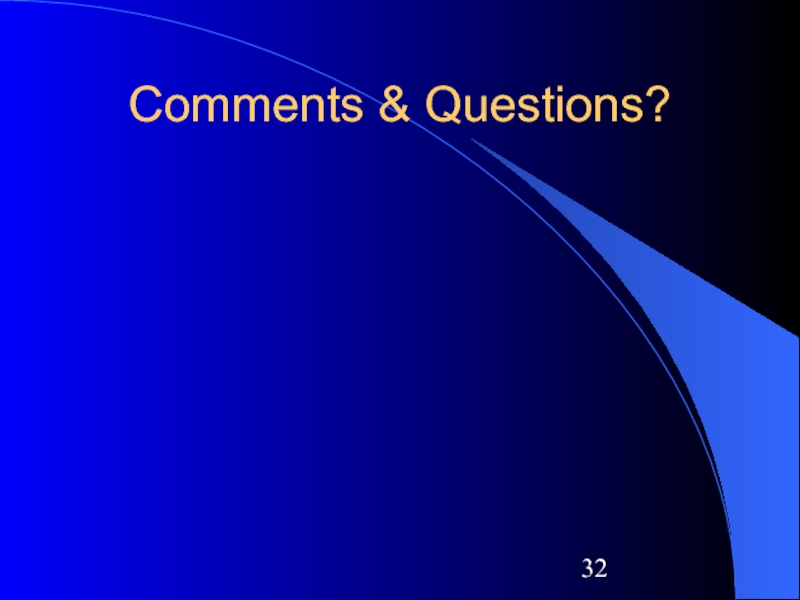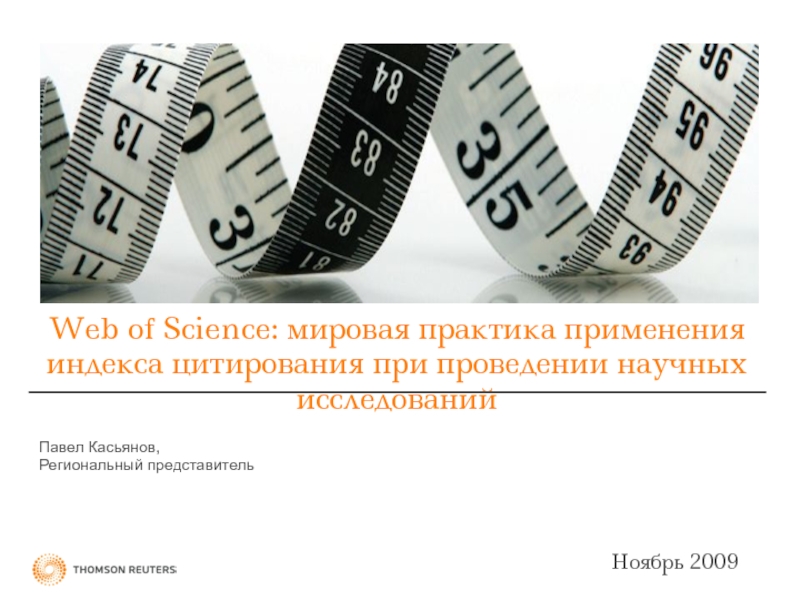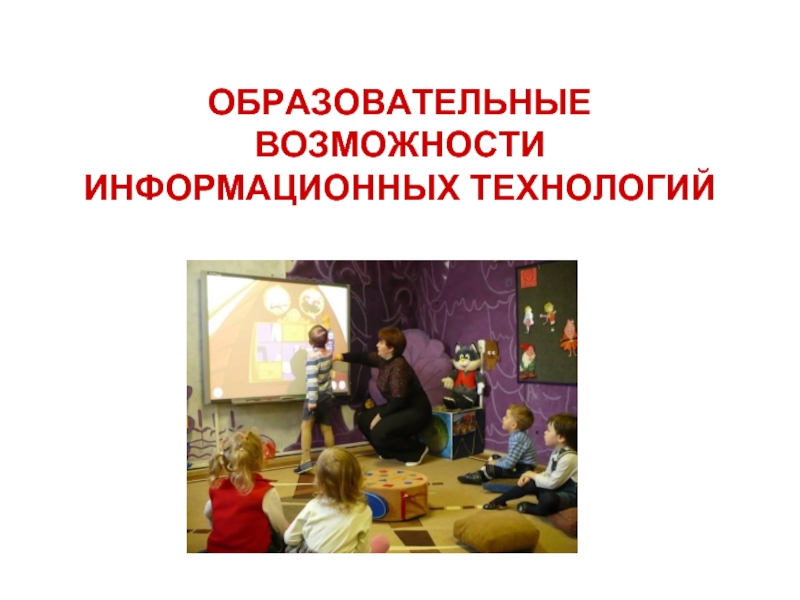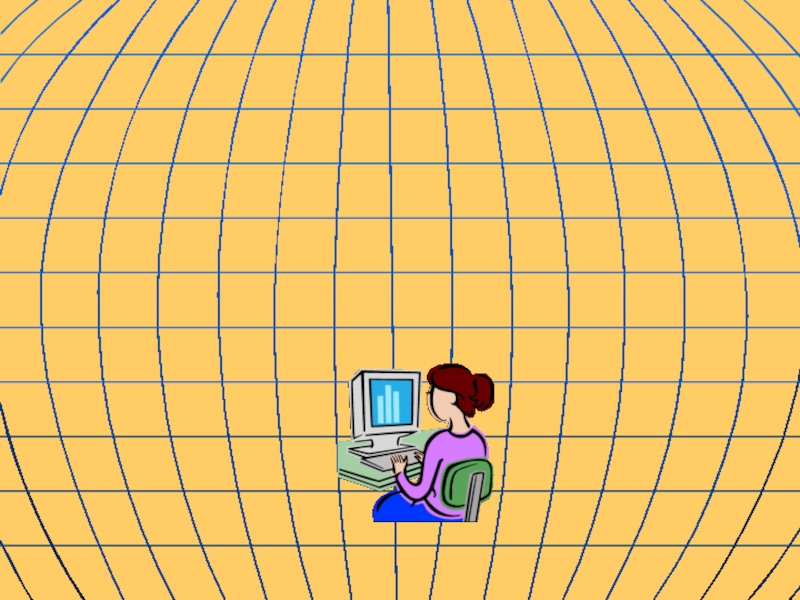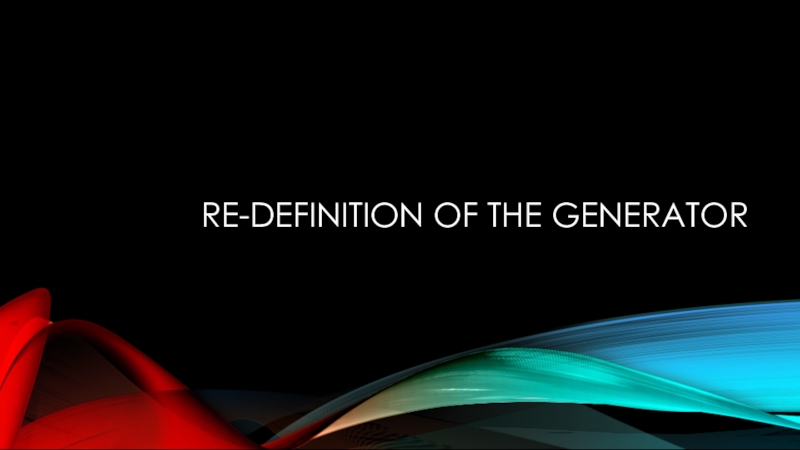- Главная
- Разное
- Дизайн
- Бизнес и предпринимательство
- Аналитика
- Образование
- Развлечения
- Красота и здоровье
- Финансы
- Государство
- Путешествия
- Спорт
- Недвижимость
- Армия
- Графика
- Культурология
- Еда и кулинария
- Лингвистика
- Английский язык
- Астрономия
- Алгебра
- Биология
- География
- Детские презентации
- Информатика
- История
- Литература
- Маркетинг
- Математика
- Медицина
- Менеджмент
- Музыка
- МХК
- Немецкий язык
- ОБЖ
- Обществознание
- Окружающий мир
- Педагогика
- Русский язык
- Технология
- Физика
- Философия
- Химия
- Шаблоны, картинки для презентаций
- Экология
- Экономика
- Юриспруденция
Virtual reality презентация
Содержание
- 1. Virtual reality
- 2. Outline Introduction The history of VR Types
- 3. Introduction What is Virtual Reality(VR)?
- 4. Introduction (Cont’d) Why VR? VR is able
- 5. Brief History In 1950s, flight simulators were
- 6. Types of VR System Windows on World(WoW)
- 7. Types of VR System(Cont’d) Telepresence A variation
- 8. Types of VR System(Cont’d) Mixed Reality(Augmented Reality)
- 9. VR Examples (Cont’d) Telepresence VR
- 10. VR Examples (Cont’d) Augmented VR
- 11. VR Examples (Cont’d) Distributed VR
- 12. Technologies of VR--Hardware Head-Mounted Display (HMD)
- 13. Technologies of VR--Hardware Binocular Omni-Orientation Monitor (BOOM)
- 14. Technologies of VR--Hardware Cave Automatic Virtual Environment
- 15. Technologies of VR--Hardware Data Glove Outfitted with
- 16. Technologies of VR--Hardware Control Devices Control
- 17. Technologies of VR--Software Toolkits Programming libraries.
- 18. Technologies of VR--Software Software packages available in
- 19. Technologies of VR--Software VRML(Virtual Reality Modeling Language)
- 20. Architecture of VR System Input Processor,
- 21. Components of VR System (Cont’d) Input Processor
- 22. Components of VR System (Cont’d) Simulation Processor
- 23. Components of VR System (Cont’d) Rendering Processor
- 24. Components of VR System (Cont’d) World Database
- 25. Applications Entertainment More vivid Move exciting More attractive
- 26. Applications (Cont’d) Medicine Practice performing surgery.
- 27. Applications (Cont’d) Manufacturing Easy to modify Low cost High efficient
- 28. Applications (Cont’d) Education & Training Driving simulators. Flight simulators. Ship simulators. Tank simulators.
- 29. Current problems & Future work Cybersickness /
- 30. Summary Visualization of complicated, large data is
- 31. Reference [1] What is Virtual Reality?, http://vr.isdale.com/WhatIsVR/frames/WhatIsVR4.1.html.
- 32. Comments & Questions?
Слайд 1Virtual Reality
CS60-520 Presentation
Instructor: Dr. Aggarwal
Student: Yang Gao
Semester: Winter 2004
Слайд 2Outline
Introduction
The history of VR
Types of VR
Technologies of VR
Architecture of VR system
Applications
of VR
Current problems & Future work
Summary
Reference
Current problems & Future work
Summary
Reference
Слайд 3Introduction
What is Virtual Reality(VR)?
Virtual Reality refers to a high-end
user interface that involves real-time simulation and interactions through multiple sensorial channels.
.
.
Слайд 4Introduction (Cont’d)
Why VR?
VR is able to immerse you in a computer-generated
world of your own making: a room, a city, the interior of human body. With VR, you can explore any uncharted territory of the human imagination.
Слайд 5Brief History
In 1950s, flight simulators were built by US Air Force
to train student pilots.
In 1965, a research program for computer graphics called “The Ultimate Display” was laid out.
In 1988, commercial development of VR began.
In 1991, first commercial entertainment VR system "Virtuality" was released.
In 1965, a research program for computer graphics called “The Ultimate Display” was laid out.
In 1988, commercial development of VR began.
In 1991, first commercial entertainment VR system "Virtuality" was released.
Слайд 6Types of VR System
Windows on World(WoW)
Also called Desktop VR.
Using
a conventional computer monitor to display the 3D virtual world.
Immersive VR
Completely immerse the user's personal viewpoint inside the virtual 3D world.
The user has no visual contact with the physical word.
Often equipped with a Head Mounted Display (HMD).
Immersive VR
Completely immerse the user's personal viewpoint inside the virtual 3D world.
The user has no visual contact with the physical word.
Often equipped with a Head Mounted Display (HMD).
Слайд 7Types of VR System(Cont’d)
Telepresence
A variation of visualizing complete computer generated worlds.
Links
remote sensors in the real world with the senses of a human operator. The remote sensors might be located on a robot. Useful for performing operations in dangerous environments.
Слайд 8Types of VR System(Cont’d)
Mixed Reality(Augmented Reality)
The seamless merging of real space
and virtual space.
Integrate the computer-generated virtual objects into the physical world which become in a sense an equal part of our natural environment.
Distributed VR
A simulated world runs on several computers which are connected over network and the people are able to interact in real time, sharing the same virtual world.
Integrate the computer-generated virtual objects into the physical world which become in a sense an equal part of our natural environment.
Distributed VR
A simulated world runs on several computers which are connected over network and the people are able to interact in real time, sharing the same virtual world.
Слайд 12Technologies of VR--Hardware
Head-Mounted Display (HMD)
A Helmet or a face mask
providing the visual and auditory displays.
Use LCD or CRT to display stereo images.
May include built-in head-tracker and stereo headphones
Use LCD or CRT to display stereo images.
May include built-in head-tracker and stereo headphones
Слайд 13Technologies of VR--Hardware
Binocular Omni-Orientation Monitor (BOOM)
Head-coupled stereoscopic display device.
Uses CRT to
provide high-resolution display.
Convenient to use.
Fast and accurate built-in tracking.
Convenient to use.
Fast and accurate built-in tracking.
Слайд 14Technologies of VR--Hardware
Cave Automatic Virtual Environment (CAVE)
Provides the illusion of
immersion by projecting stereo images on the walls and floor of a room-sized cube.
A head tracking system continuously adjust the stereo projection to the current position of the leading viewer.
A head tracking system continuously adjust the stereo projection to the current position of the leading viewer.
Слайд 15Technologies of VR--Hardware
Data Glove
Outfitted with sensors on the fingers as well
as an overall position/orientation tracking equipment.
Enables natural interaction with virtual objects by hand gesture recognition.
Enables natural interaction with virtual objects by hand gesture recognition.
Слайд 17Technologies of VR--Software
Toolkits
Programming libraries.
Provide function libraries (C & C++).
Authoring systems
Complete
programs with graphical interfaces for creating worlds without resorting to detailed programming.
Слайд 18Technologies of VR--Software
Software packages available in market
Multiverse (Freeware)
Virtual Reality Studio
($100)
Sense8 World Tool Kit (WTK) (over $1000)
Autodesk Cyberspace Development kit (over $1000)
Sense8 World Tool Kit (WTK) (over $1000)
Autodesk Cyberspace Development kit (over $1000)
Слайд 19Technologies of VR--Software
VRML(Virtual Reality Modeling Language)
Standard language for interactive simulation within
the World Wide Web.
Allows to create "virtual worlds" networked via the Internet and hyperlinked with the World Wide Web.
Aspects of virtual world display, interaction and internetworking can be specified using VRML without being dependent on special gear like HMD.
VR models can be viewed by Netscape or IE with a browser plug-in.
Allows to create "virtual worlds" networked via the Internet and hyperlinked with the World Wide Web.
Aspects of virtual world display, interaction and internetworking can be specified using VRML without being dependent on special gear like HMD.
VR models can be viewed by Netscape or IE with a browser plug-in.
Слайд 20Architecture of VR System
Input Processor, Simulation Processor, Rendering Processor and
World Database.
Input
Processor
Rendering
Processor
World Database
Simulation
Processor
visual, auditory, haptic, touch…
Position &
Orientation
Слайд 21Components of VR System (Cont’d)
Input Processor
Control the devices used to input
information to the computer. The object is to get the coordinate data to the rest of the system with minimal lag time.
Keyboard, mouse, 3D position trackers, a voice recognition system, etc.
Keyboard, mouse, 3D position trackers, a voice recognition system, etc.
Слайд 22Components of VR System (Cont’d)
Simulation Processor
Core of a VR system.
Takes the
user inputs along with any tasks programmed into the world and determine the actions that will take place in the virtual world.
Слайд 23Components of VR System (Cont’d)
Rendering Processor
Create the sensations that are output
to the user.
Separate rendering processes are used for visual, auditory, haptic and other sensory systems. Each renderer take a description of the world stat from the simulation process or derive it directly from the World Database for each time step.
Separate rendering processes are used for visual, auditory, haptic and other sensory systems. Each renderer take a description of the world stat from the simulation process or derive it directly from the World Database for each time step.
Слайд 24Components of VR System (Cont’d)
World Database (World Description Files)
Store the objects
that inhabit the world, scripts that describe actions of those objects.
Слайд 26Applications (Cont’d)
Medicine
Practice performing surgery.
Perform surgery on a remote patient.
Teach new
skills in a safe, controlled environment.
Слайд 28Applications (Cont’d)
Education & Training
Driving simulators.
Flight simulators.
Ship simulators.
Tank simulators.
Слайд 29Current problems & Future work
Cybersickness / simulator sickness
Low-fidelity
Expensive
Lack of integration between
application packages
High-fidelity system
Cost-saving
Collaborative
High-level contact between participants in distributed VR
High-fidelity system
Cost-saving
Collaborative
High-level contact between participants in distributed VR
Слайд 30Summary
Visualization of complicated, large data is helpful for understanding and analysis.
VR
offers us a new way to interact with computer.
VR enables us to experience the virtual world that is impossible in real world.
VR is changing our life, eventually VR will increasingly become a part of our life.
VR enables us to experience the virtual world that is impossible in real world.
VR is changing our life, eventually VR will increasingly become a part of our life.
Слайд 31Reference
[1] What is Virtual Reality?, http://vr.isdale.com/WhatIsVR/frames/WhatIsVR4.1.html.
[2] Augumented and Mixed Reality, http://www.mic.atr.co.jp/~poup/research/ar/.
[3]
Virtual Reality Applications, http://vresources.jump-gate.com/applications/applications.shtml.
[4] K.-P. Beier. Virtual Reality: A short Introduction. http://www-vrl.umich.edu/intro/
[5] Franchi,J. Vertual Reality: An Overview. ERIC Digest, June 1995
[4] K.-P. Beier. Virtual Reality: A short Introduction. http://www-vrl.umich.edu/intro/
[5] Franchi,J. Vertual Reality: An Overview. ERIC Digest, June 1995

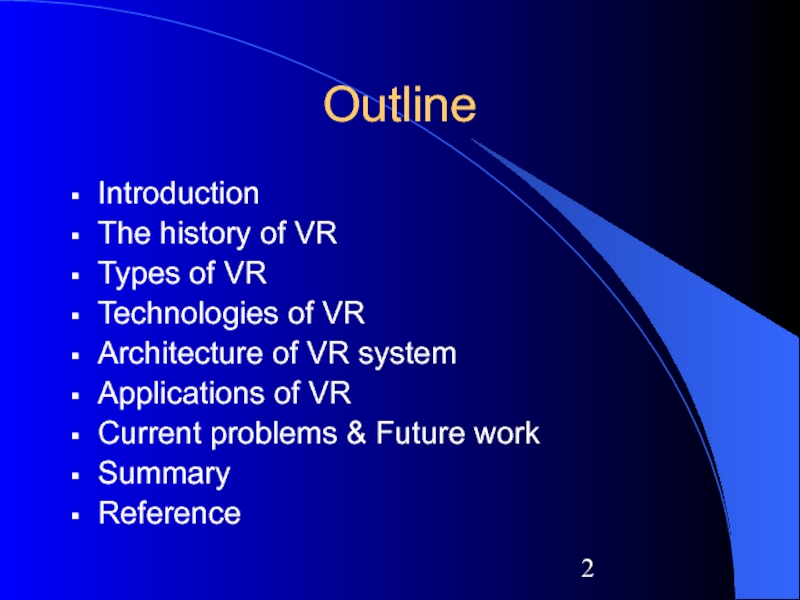
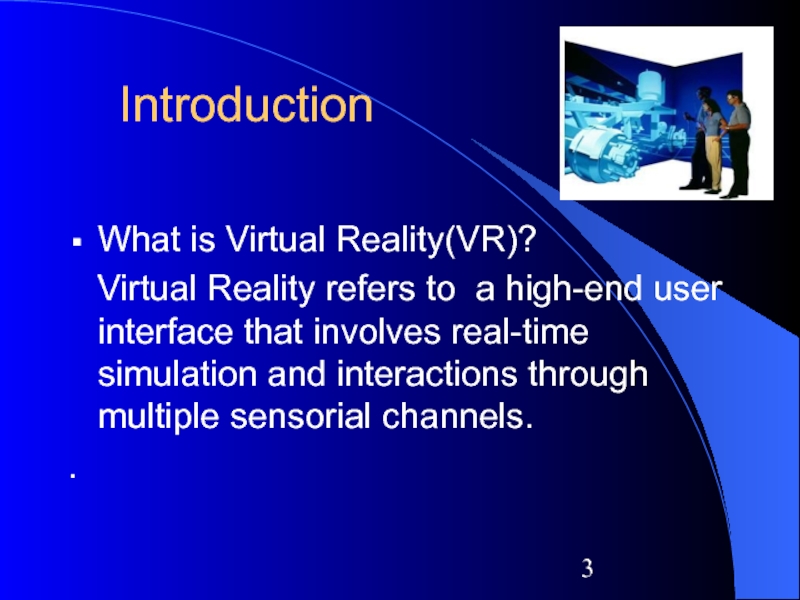
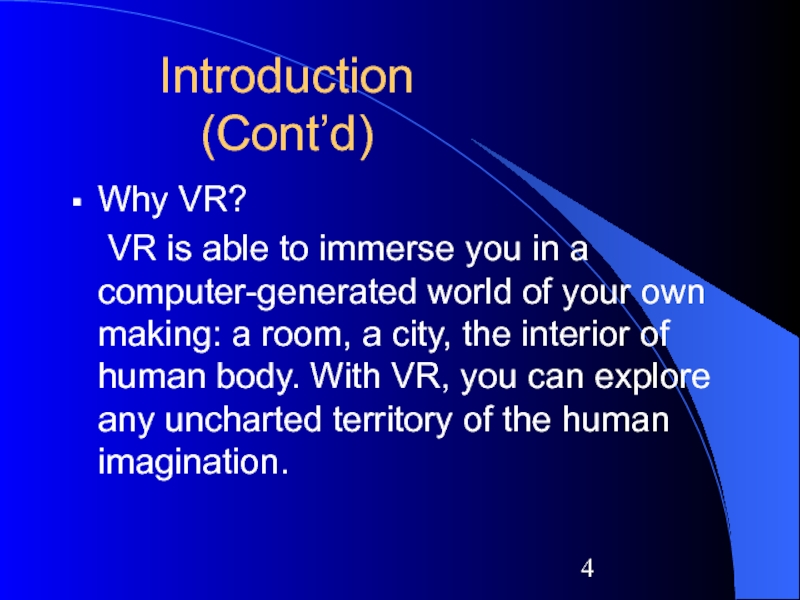
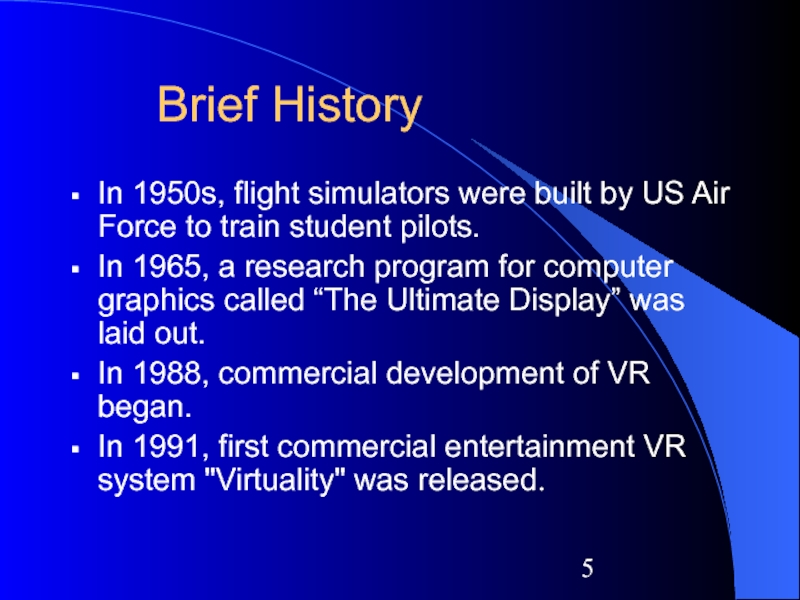
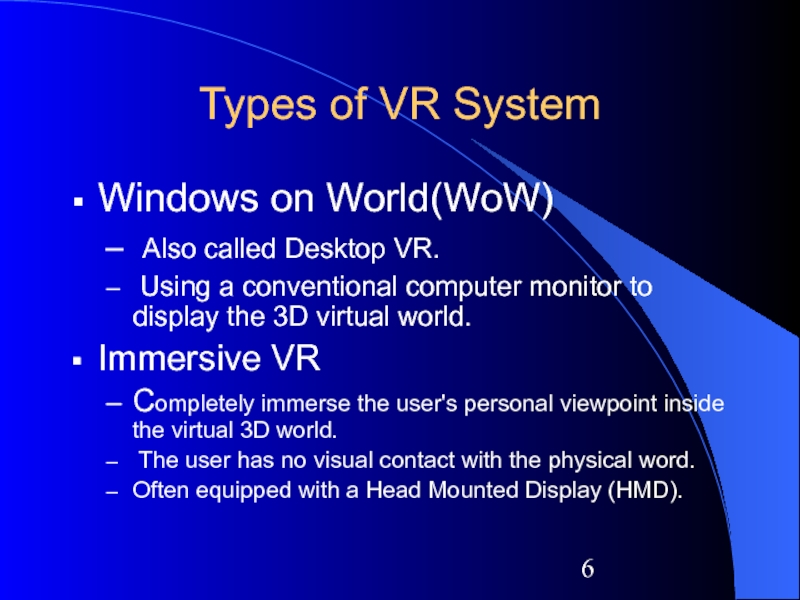
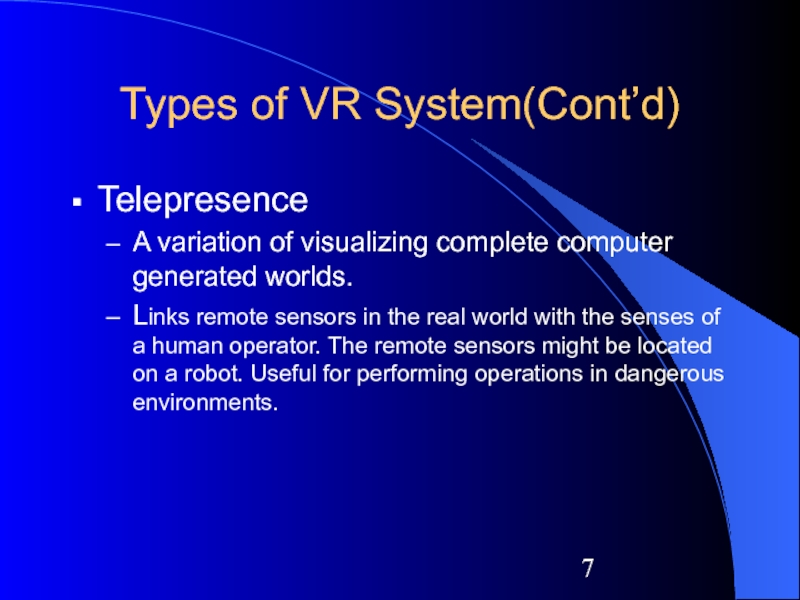
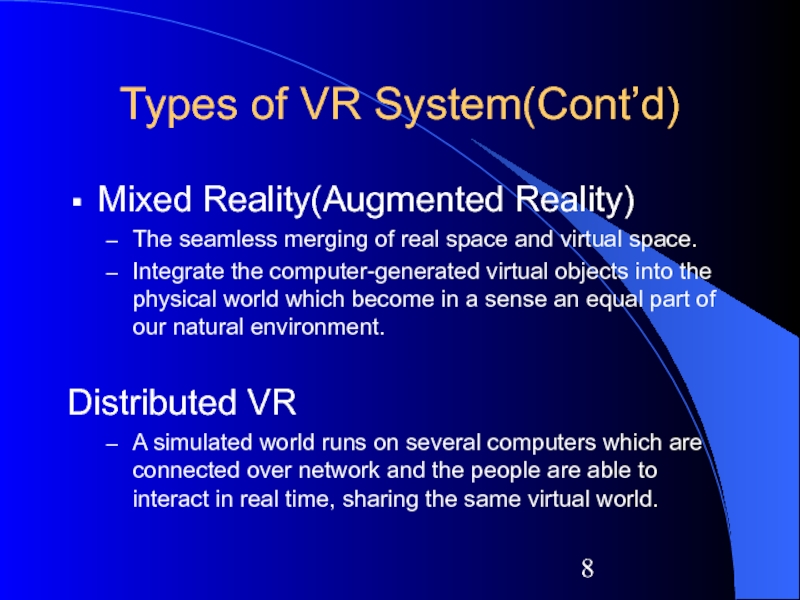
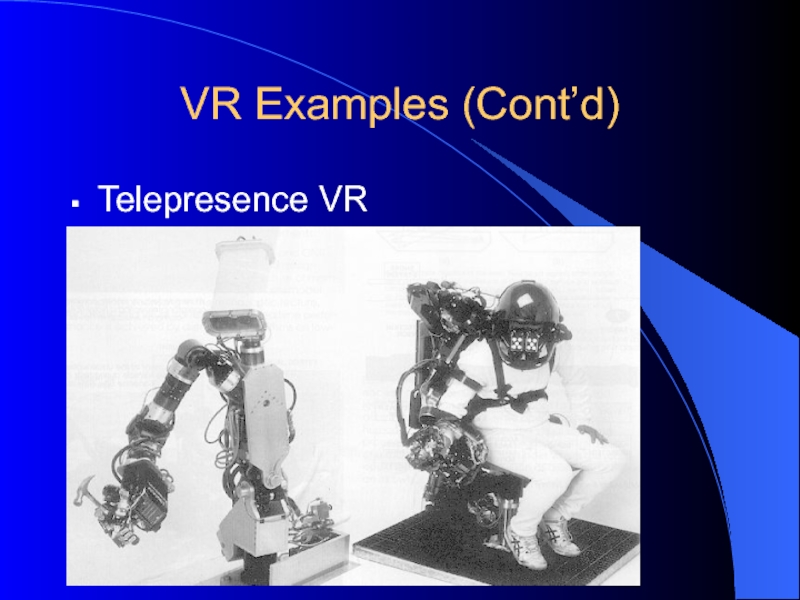
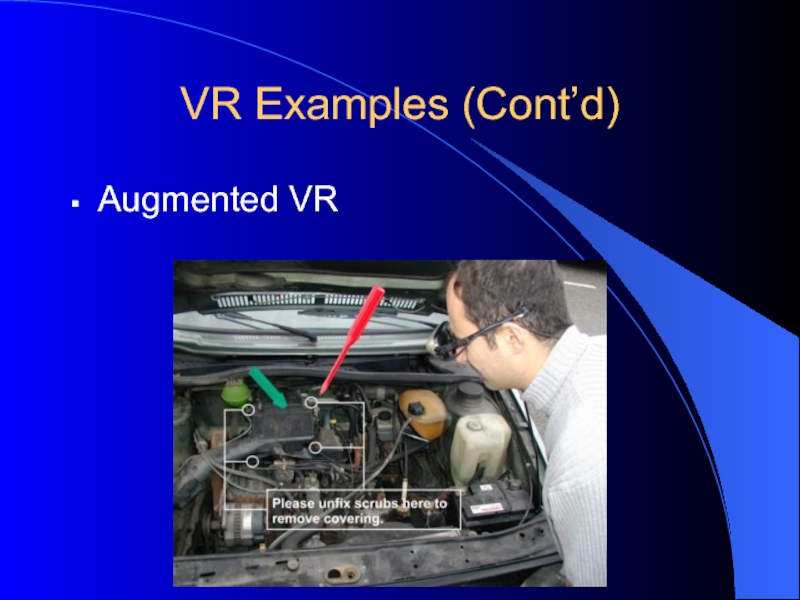
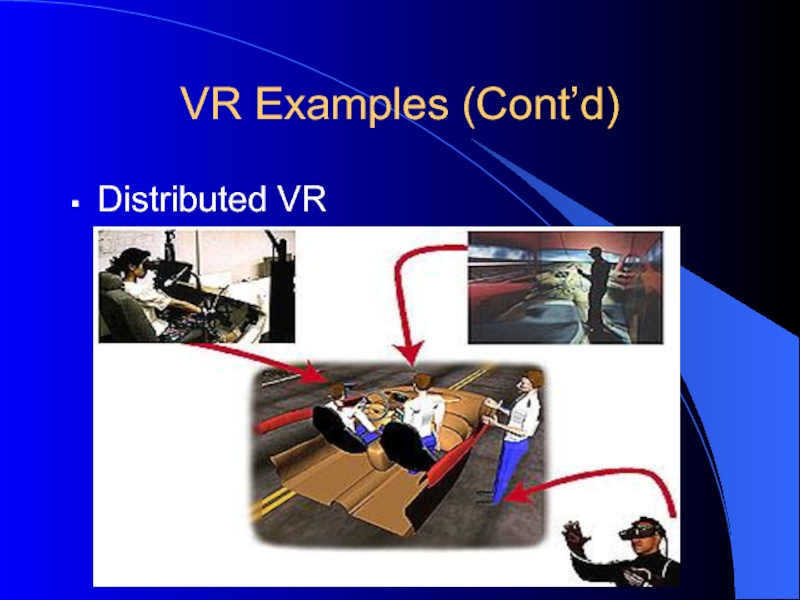
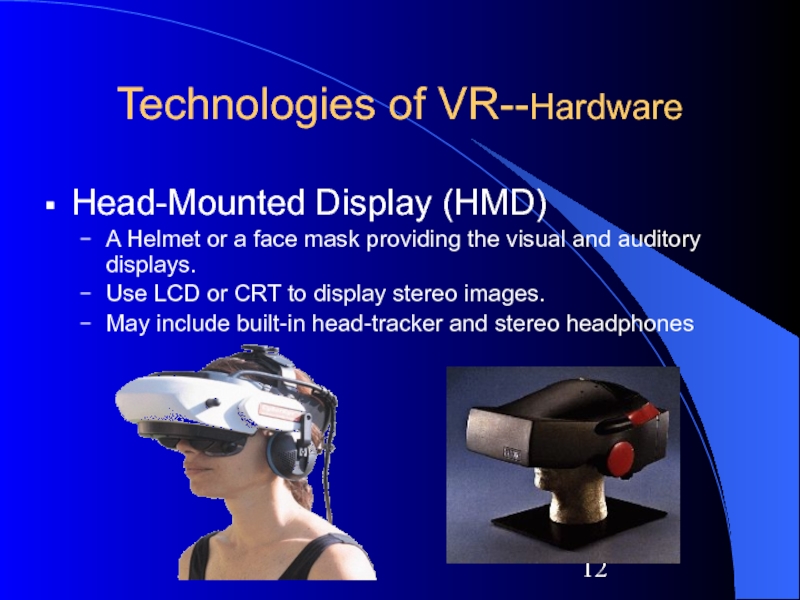
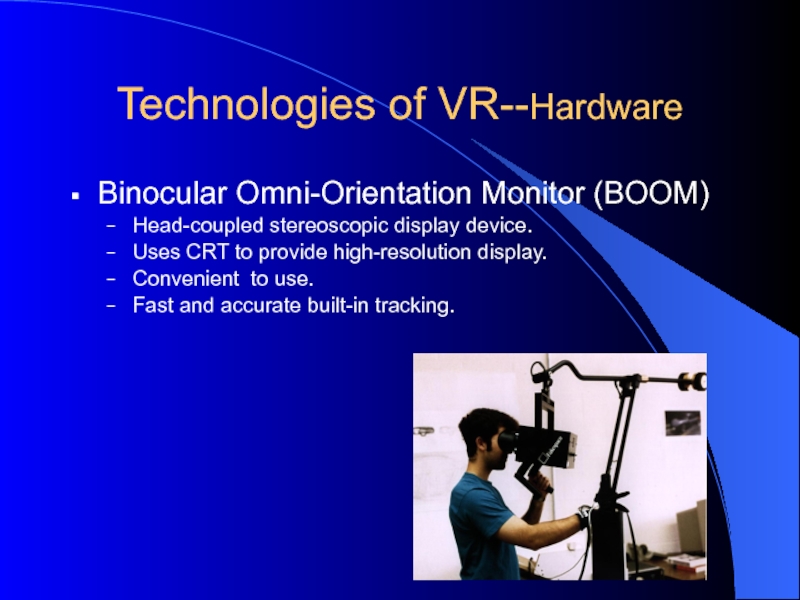
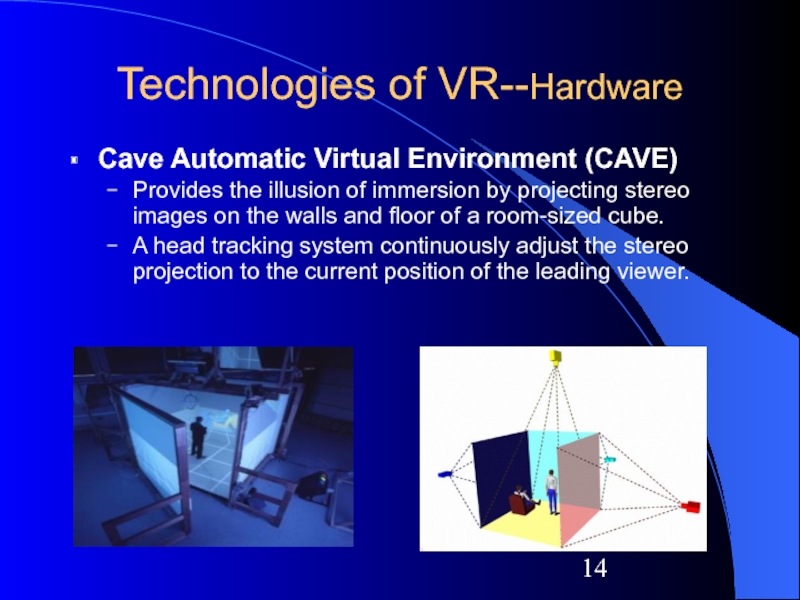
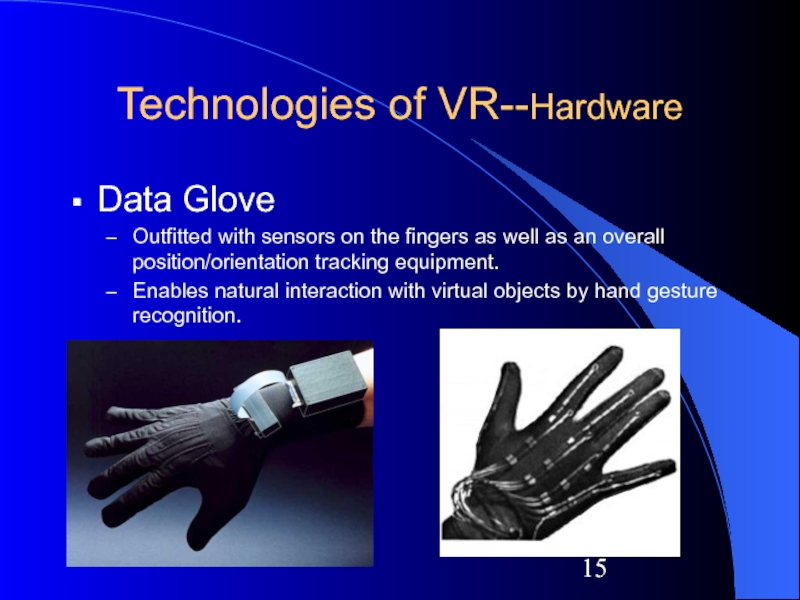
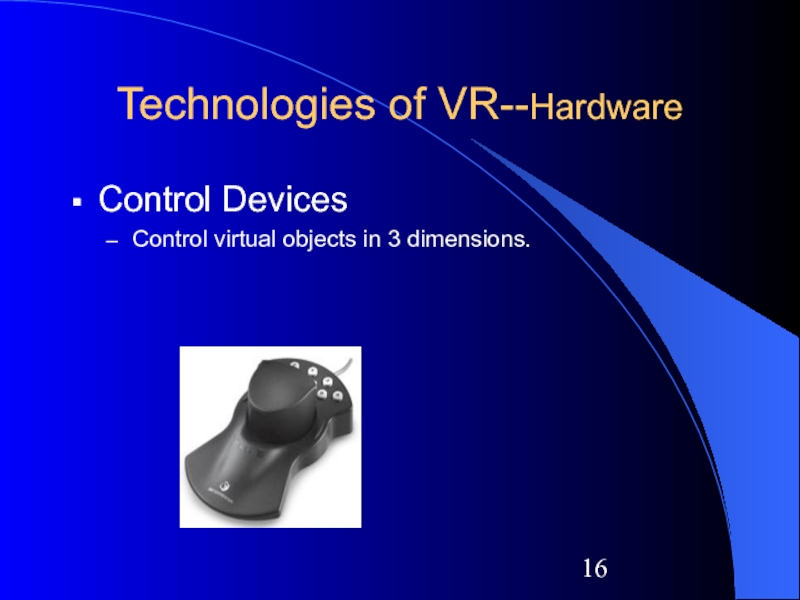
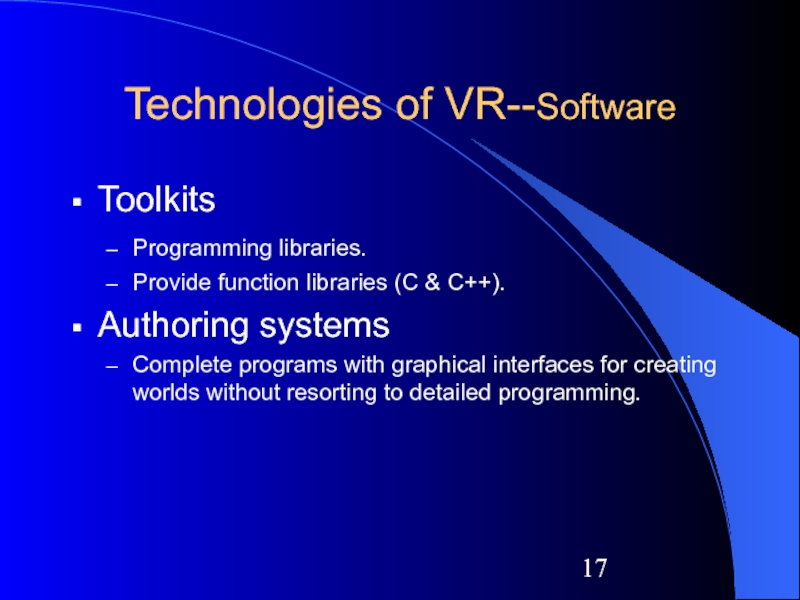
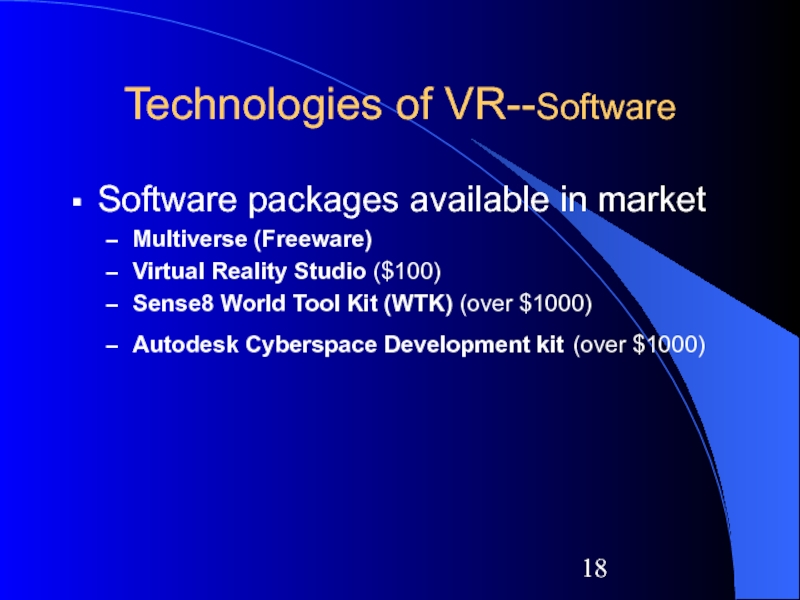
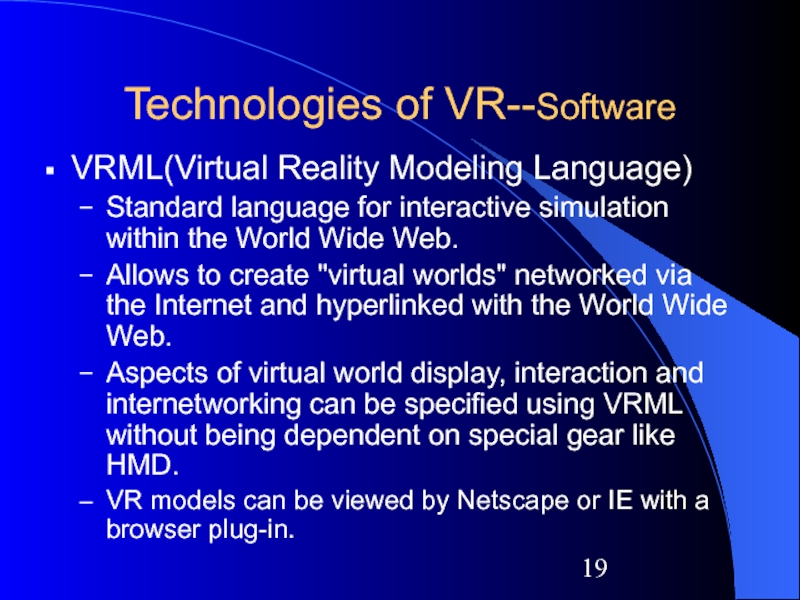
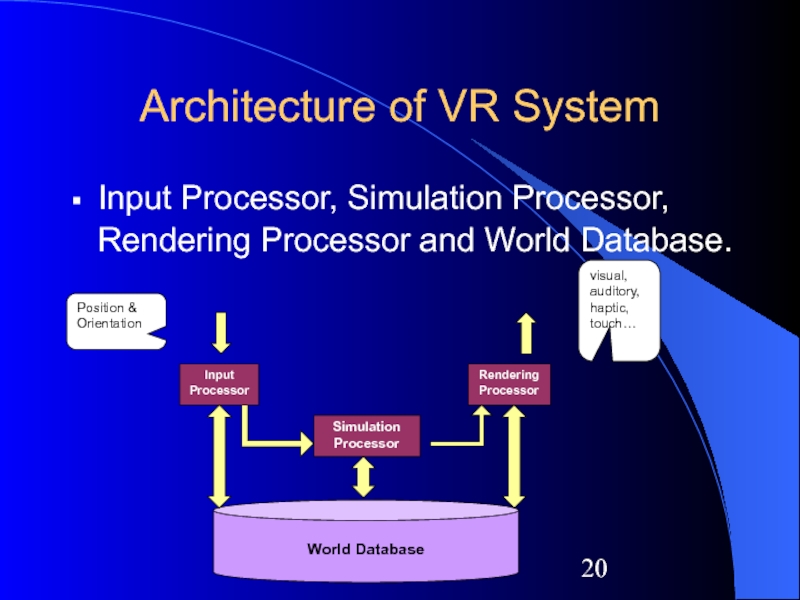
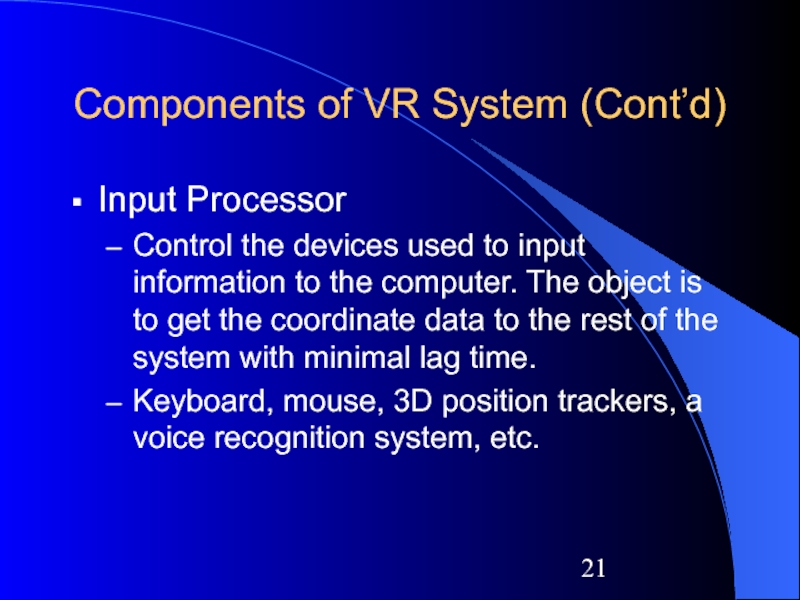
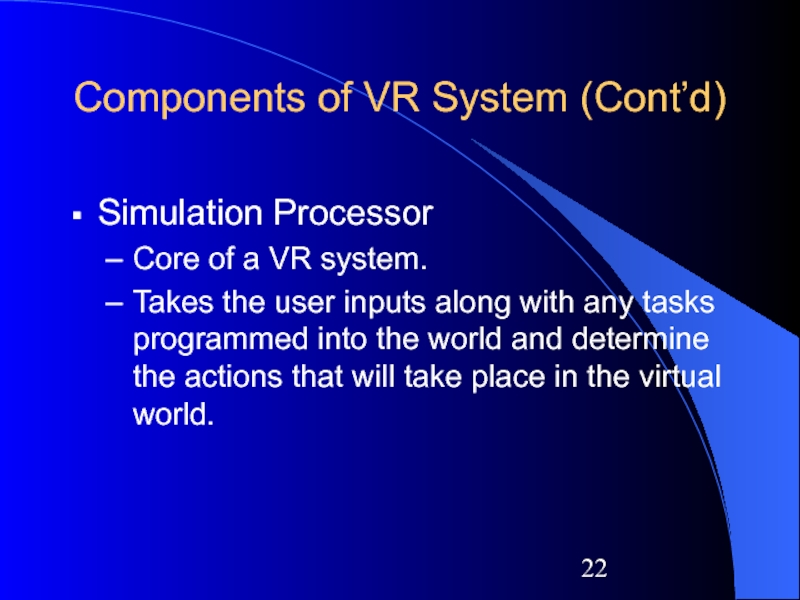
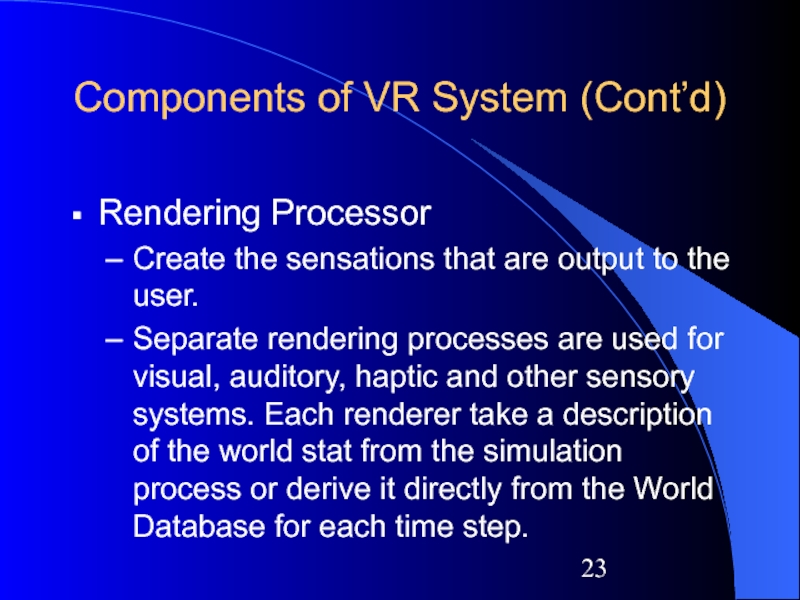
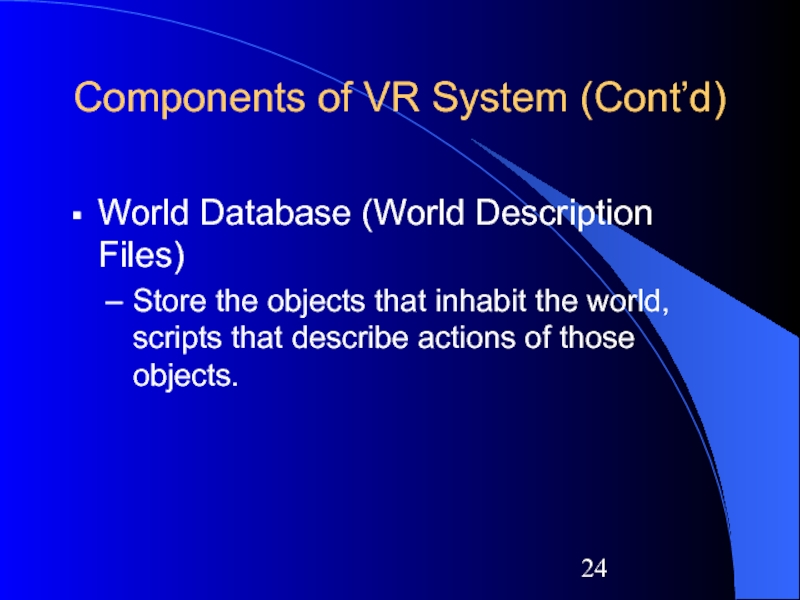
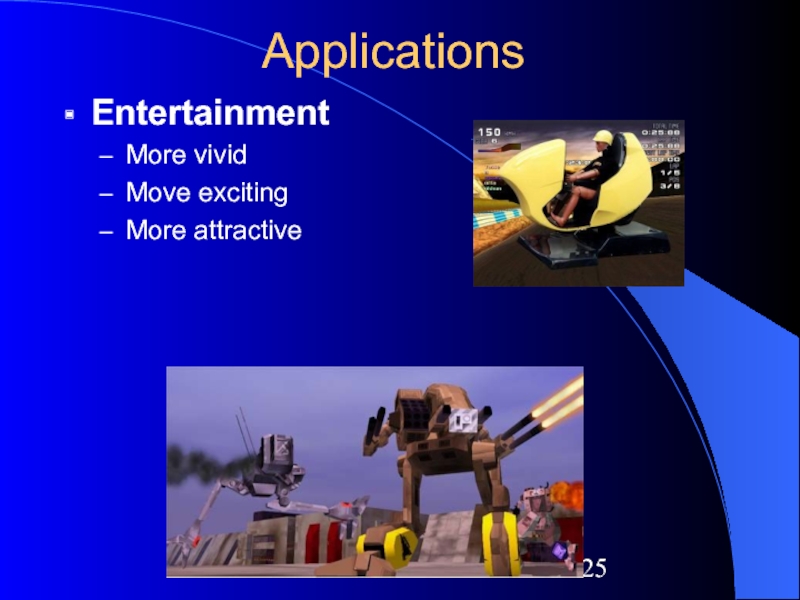
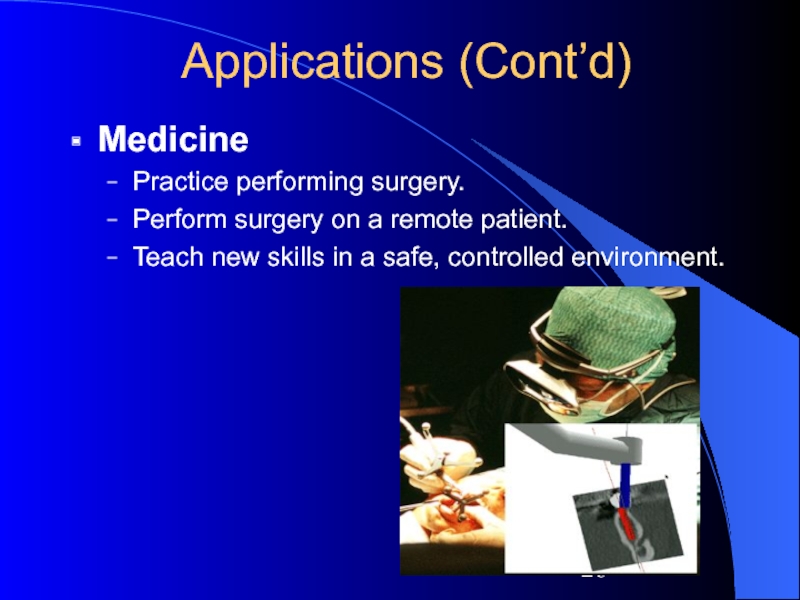
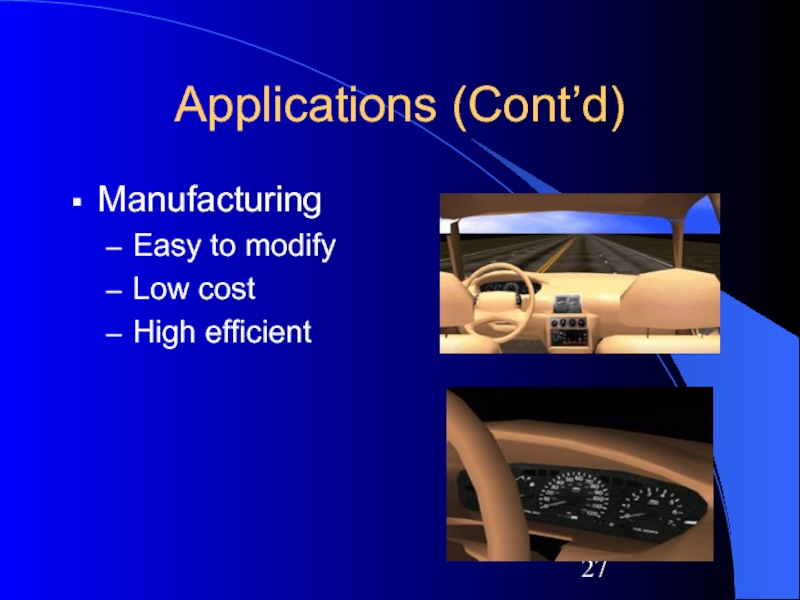
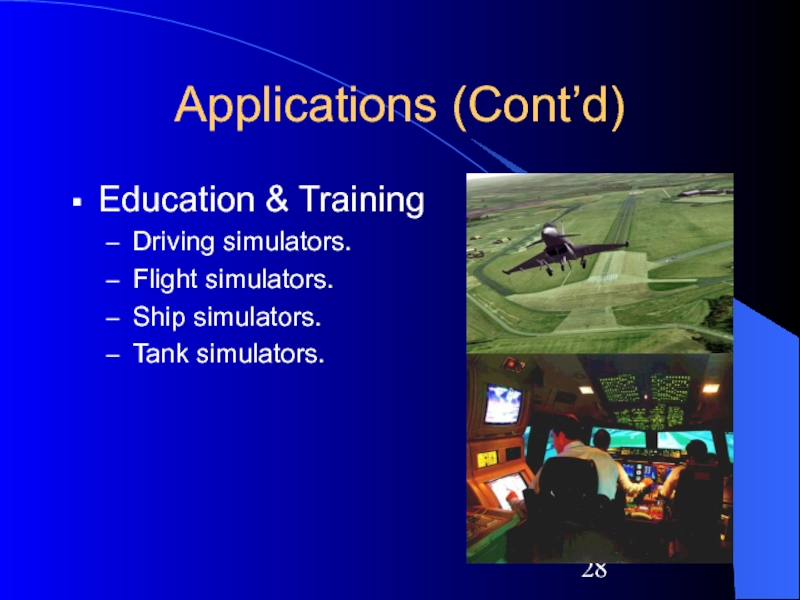
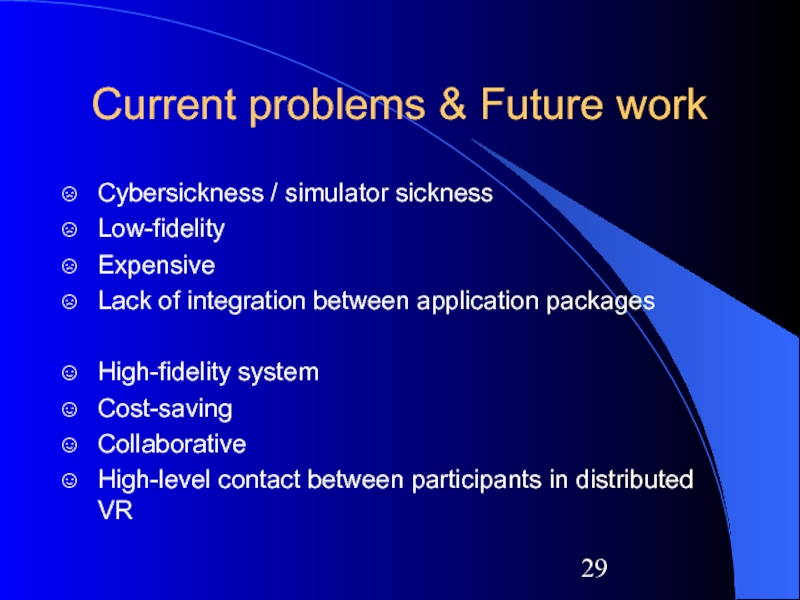
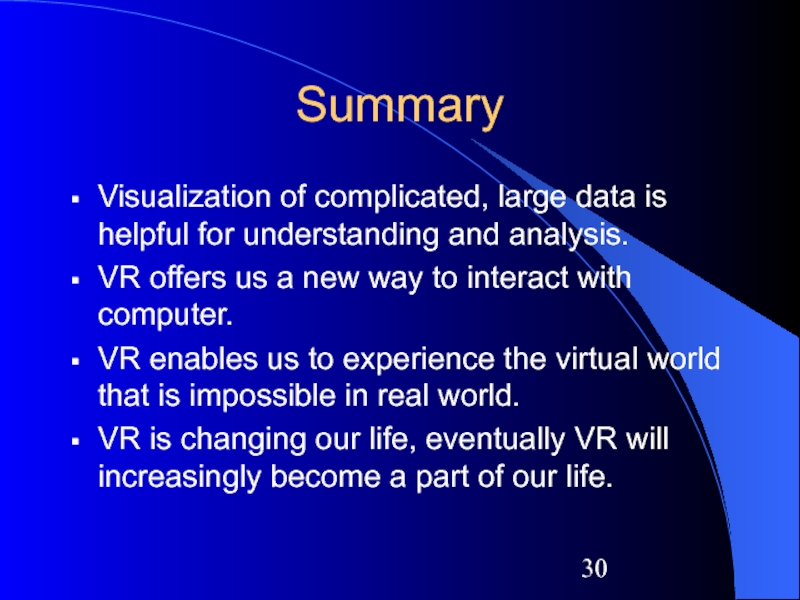
![Reference[1] What is Virtual Reality?, http://vr.isdale.com/WhatIsVR/frames/WhatIsVR4.1.html.[2] Augumented and Mixed Reality, http://www.mic.atr.co.jp/~poup/research/ar/.[3] Virtual Reality Applications, http://vresources.jump-gate.com/applications/applications.shtml.[4]](/img/tmb/5/427051/4a0c345d34c04d823d7f78cf42a66520-800x.jpg)
